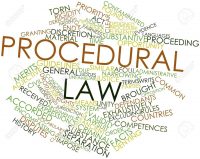Procedural law is the collection of rules that govern how courts do their business. All levels and types of courts use procedural law. It controls how courts hear cases. It also dictates what a party must do in order to bring their case before the court. Where does procedural law come from? Each court has their own procedures. For example, the Federal Rules of Civil Procedure apply to federal courts. States have their own rules of civil procedure. There are also separate (…)
Working For The Central Intelligence Agent (CIA Agent)
The Central Intelligence Agency is the primary agency in the United States that is responsible for providing the government with global intelligence for the ever changing social, economic, political, military, and technological environments throughout the world. The main goal and mission of a CIA agent is to protect the United States national security. According to the CIA.gov careers section, there are myriad of job types available including: IT, Business, and Security Positions Security positions IT positions Business positions Analytical positions Language positions Clandestine service (…)
Constitutional Law
Constitutional law is the law that relates to interpreting, implementing and amending the United States constitution and the constitutions of the 50 states. It is an area of law that focuses on what the constitution says, what it means and what its limitations are. As social and political issues change and develop in the United States, attorneys who practice constitutional law bring these issues to the courts to ask for clarification about the meaning, interpretation and enforcement of the constitution. (…)
Social Security Disability Law
Social Security disability laws provide assistance to individuals with disabilities. Benefits provided under these laws include insurance that will pay benefits to both the disabled individual and their family as long as you have paid enough in social security through work. Supplemental security income is provided based on financial needs. An attorney is not allowed to charge you a fee unless it has been approved by Social Security. Social Security Disability Insurance benefits are only paid to individuals who are totally disabled, as that term (…)
Health Care Law
In the United States health care laws had remained pretty much the same for many years until the Affordable Care Act was passed. The Affordable Care Act offers reform to the current health care laws that are in place and provides individuals with new options for coverage, consumer protection, and offers the citizens of the country the chance to make better and more informed choices about their health. Health Care Law, federal and state administered, deals with issues related to (…)
Appellate Law Practice
A trial isn’t always the end of the case. One or both parties may want to appeal part or all of the trial verdict. In addition, they may want to appeal certain aspects of the lower court’s proceedings that they believe may have led the jury or the court to make the wrong decision. The process of asking a higher court to review a decision made by a lower court or an administrative agency is called an appeal. Attorneys who (…)
Tax Law
Tax law is the practice of law that relates to the assessment and payment of taxes. Tax laws come from a variety of sources. They come from federal, state and local authorities. They’re based in federal and state constitutions, laws and regulations. Tax law involves understanding, implementing and defending the payment or non-payment of taxes. Tax lawyers help their clients understand tax laws and conduct their affairs in a way that’s advantageous with regards to tax laws. When disputes occur, (…)
FDA Law
Food and Drug Administration law, or FDA law, is the body of law that regulates food, cosmetic and drug manufacturing and sale in the United States. The goal of FDA law is to make food and drugs safe for public consumption. The goal is to provide consumers with honest information about the contents of a product so that consumers can make informed choices. FDA law also exists to regulate how food and drug manufacturers maintain the rights to profit from (…)
Mining Law
Mining law is the collection of laws and regulations that apply to mining activities. There are a diverse set of laws and rules that directly and indirectly govern mining in the United States. Mining laws determine who can mine, where they can mine and how they may go about mining. Mining laws include federal, state and local laws and regulations Mining laws come from a number of sources. The federal government has laws that govern mining on both public and (…)
Communications Law
Communications law is the practice of law that relates to the exchange of information using technology. It’s any law that involves the regulation and use of electronic telecommunication. Communication law includes technologies like radio, television, cable and broadband internet. It involves the creation of rules and policies that govern use of these technologies. Communication regulations govern both public and private communications. Lawmakers create these regulations with the goal of making communication technologies accessible to all Americans at a reasonable price. (…)
Antitrust Law
Antitrust law is the broad category of federal and state laws that are meant to keep business operating honest and fairly. Antitrust laws regulate the way companies do business. The goal is to level the playing the field in the free market and prevent businesses from having too much power. For the purposes of antitrust law, a trust is a large group of businesses that work together or combine in order to form a monopoly or control the market. Major (…)
Health Law
Health law is the wide body of law that regulates the provision of healthcare services. Health law governs the relationship between those who provide healthcare and those who receive it. There are many topics and subtopics involved in the provision of healthcare law including provision of services, contracts, employment law and fraud. Health lawyers may focus on one area of healthcare law, or they may provide comprehensive legal services for a healthcare provider. Major health law legislation in the United (…)
Maritime Law
Maritime law is the collection of laws and agreements that govern behavior and activities on the seas. The area of law governs how people interact and do business on the waters of the world. Also called admiralty law, maritime law primarily governs activities on international waters. However, there are also laws that apply to the waters in and near each country. Generally, each country applies their own laws to inland waters like lakes and rivers. When most Americans board a (…)
Doctor of Laws (J.S.D./S.J.D.)
After graduating with a Juris Doctor a person is eligible for practicing law in the particular state where they pass their bar examination. A person may then go on to specialize in a specific area of the law and study for a Master of Laws degree. For those individuals that prefer to work in academia or in other types of work that has an emphasis in legal scholarship, the Doctor of Laws is the next step. A Doctor of Laws (…)
Public Health Law
Law plays an important role in the public health care system. A public health official has many responsibilities and legal rights when protecting and promoting their community’s health. There are three areas associated with public health law, law of populations, prevention of disease and injury, and police power. Public health law is a field that focuses legal practice, scholarship and advocacy on issues involving the government’s legal authorities and duties “to ensure the conditions for people to be healthy,” and (…)
Civil Rights Law
Civil rights law is the area of law that gives people in society the right to be free from certain types of discrimination. It’s the area of law that gives people the right to equal and fair treatment in society. Civil rights law creates protected classes of people. It gives people in these classes the protection of the law when others try to discriminate against them based on the class characteristic. What are civil rights laws? Civil rights laws are (…)
Types of Law Degrees
According to the Bureau of Labor Statistics (BLS), becoming a lawyer requires a minimum of two degrees over the course of 7 years of full-time study – 4 years for an undergraduate degree, followed by a 3 year law degree earned from a law school accredited by the ABA. If you are considering law school, generally there are three different types of law degrees a person can earn in the U.S.A. These degrees include a Juris Doctor, a Master of Laws, and a (…)
FBI Careers
FBI agents have the difficult job of conducting national security investigations that can be extremely sensitive. In addition, the job as an FBI agent requires an individual to enforce more than 300 federal statutes. Some matters that an FBI agent may work on include cyber crime, foreign counterintelligence, terrorism, white collar crime, organized crime, civil rights violations, public corruption, bank robberies, kidnapping, air piracy, drug trafficking, as well as other violations of federal law. FBI Requirements There is a specific (…)
Food Law
Food law is the collection of laws and regulations that govern food production, distribution and consumption. Food laws aim to protect consumers and provide for the efficient growth and use of food in the United States. Food attorneys focus their careers on helping clients comply with food laws and regulations. In addition, they work on behalf of government agencies making or enforcing food laws and policies. Food laws cover a variety of topics Most people know that food laws govern (…)
Biotechnology Law
Biotechnology law is the broad name for the area of law practice that encompasses biotechnology. It is a relatively new field of legal practice as it has only been around since about 1970. Lawyers that practice in this area often will be involved in a biotechnology project from the beginning, throughout the development process, marketing, and bringing the idea to fruition. Biotechnology law includes several aspects such as contract, tax, real property, corporation, and intellectual property. Biotechnology is technology that relates (…)




















